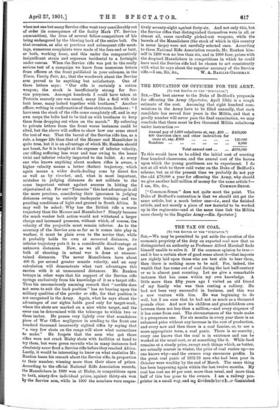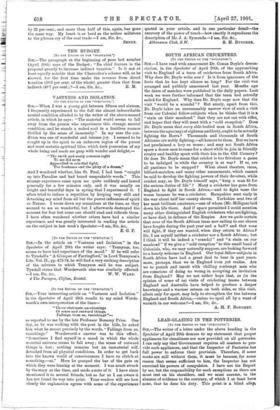THE TAX ON COAL.
(To THZ EDITOR OF THE " SPEQTATOR.1 SIR,—We may be permitted to put aside the question of the economic propriety of the duty on exported coal now that, so distinguished an authority as Professor Alfred Marshall finds himself unable to solve it. If the common opinion be true— and it has a certain show of good sense about it—that imposts are rightly laid upon those who are best able to bear them, then there is nothing more to be said. For, indeed, the wealth that has come out of coal during the last half-century or so is almost past counting. Let me give a remarkable instance that has come within my own knowledge. A little more than fifty years ago I visited an old friend of my family who was then renting a colliery. He had not been very successful in business, and this was a new venture with him. He was beginning to do well, but I am sure that he had not as much as a thousand pounds clear. And now his children and grandchildren own between them not less than a million,—and every sixpence of it has come from coal. The circumstances of the trade make it a prosperous one. For six months in every year there is an enhanced price without any increase in the cost of production, and every now and then there is a coal famine, or, to use a more appropriate term, a coal panic. There is no scarcity; every one knows that the coal is in existence and can be worked at the usual cost, or at something like it. While food remains at a steady price, except such things which, as butter, are actually scarcer in winter, the price of coal rushes up—no one knows why—and the owners reap enormous profits. In the great coal panic of 1872-73 men who had been poor in October were wealthy by the end of March. The same thing has been happening again within the last twelve months. My coal has cost me 40 per cent. more than usual, and more than half of this has gone to the owners. I am a railway pro- prietor in a small way, and ms dividenallia‘:e.b...in diminished
by 25 per cent., and more than half of this, again, has gone the same way. My heart is as hard as the nether millstone to the piteous cry of the coal trade.—I am, Sir, &c.,
SENEX.























































 Previous page
Previous page